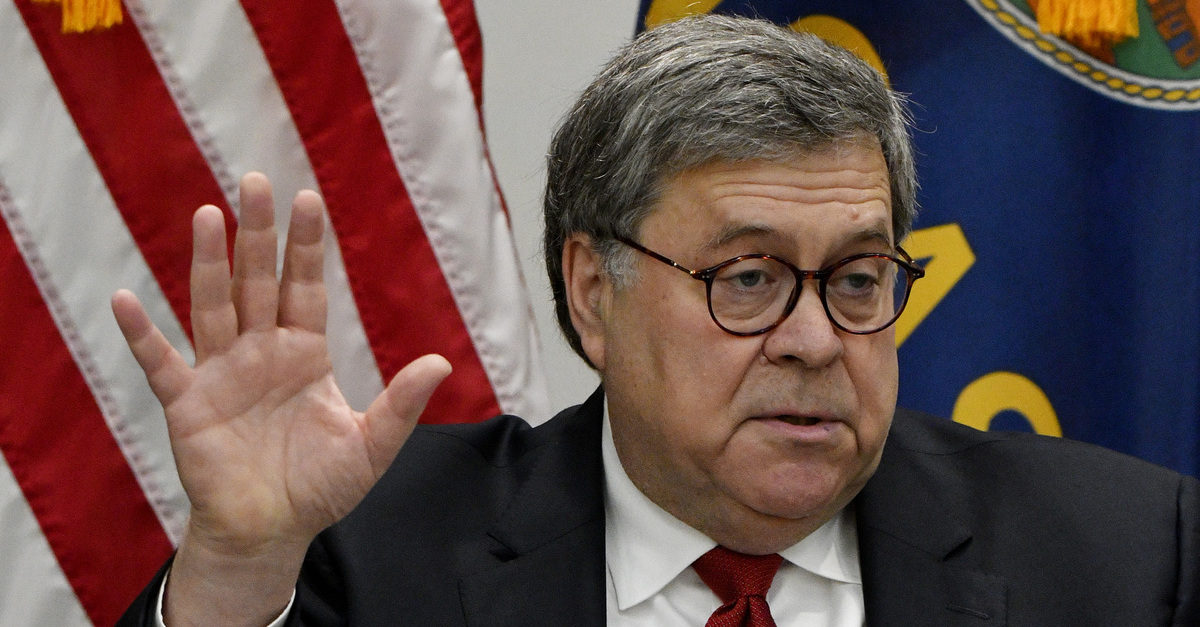
Attorneys representing President Donald Trump have contended that the articles of impeachment should be dismissed, arguing that “abuse of power” and “obstruction of Congress” are not violations of “already known and established law” and therefore cannot constitute impeachable offenses.
As previously reported by Law&Crime, this novel constitutional interpretation–which contradicts more than a century of legal scholarship–was widely panned by attorneys and law professors. But, as New York Times national security and legal policy correspondent Charlie Savage pointed out Tuesday, it’s also been contradicted by U.S. Attorney General William Barr.
Prior to his second appointment as U.S. Attorney General, Barr in 2018 submitted a confidential memorandum of law positing that the president cannot be found to have obstructed justice for interfering in an investigation into his own conduct. Barr’s unsolicited memo was widely viewed as a solicitation to replace an embattled Jeff Sessions; it espoused an expansive theory of executive power that dovetailed perfectly with the Trump administration’s hostility towards the ongoing Mueller investigation.
Barr’s memo questioned the legality and scope of Mueller’s investigation, arguing that the president could not be forced to answer questions about his firing of former FBI Director James Comey because it was a lawful exercise of his power under Article II of the U.S. Constitution.
According to Barr’s memo, while there was “no legal prohibition against the President’s acting on a matter in which he has a personal stake,” there was a political constraint: impeachment by Congress.
“Every four years the people as a whole make a solemn national decision as to the person whom they trust to make these prudential judgments. In the interim, the people’s representatives stand watch and have the tools to oversee, discipline, and, if they deem appropriate, remove the President from office,” Barr wrote. “Thus, under the Framers’ plan, the determination whether the President is making decisions based on ‘improper’ motives or whether he is ‘faithfully’ discharging his responsibilities is left to the People, through the election process, and the Congress, through the Impeachment process.”
He continued [emphasis ours]:
The Framers’ idea of political accountability has proven remarkably successful, far more so than the disastrous experimentation with an “independent” counsel statute, which both parties agreed to purge from our system. By and large,fear of political retribution has ensured that, when confronted with serious allegations of misconduct within an Administration, Presidents have felt it necessary to take practical steps to assure the people that matters will be pursued with integrity. But the measures that Presidents have adopted are voluntary, dictated by political prudence, and adapted to the situation; they are not legally compelled. Moreover, Congress has usually been quick to respond to allegations of wrongdoing in the Executive and has shown itself more than willing to conduct investigations into such allegations. The fact that President is answerable for any abuses of discretion and is ultimately subject to the judgment of Congress through the impeachment process means that the President is not the judge in his own cause.
Barr’s determination that Congress is charged with ensuring a president’s decisions square with his oath of office, and can lawfully remove a president for failing to do so, directly contradicts the primary argument being made by Trump’s legal team and undercuts the administration’s defense of Trump’s conduct.
Read the full 2018 Barr memo here.
[image via Ed Zurga/Getty Images]